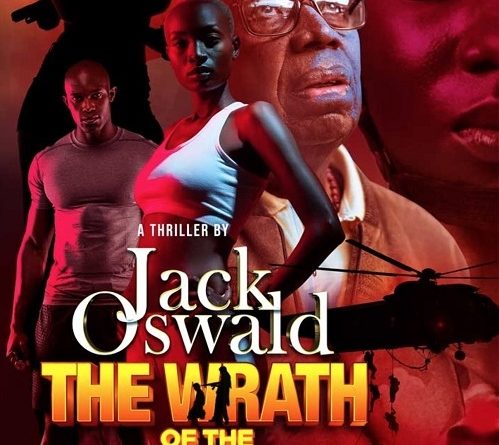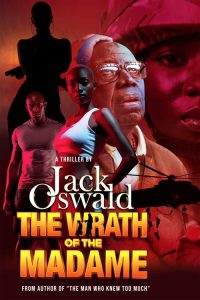Data And Fraud: Interview With Jack Oswald On His Latest Novel – The Wrath Of The Madame


The Oasis Reporters
January 20, 2024
Recently, discussions on data protection have taken the centerstage in political, business and personal conversations across the world. This is due to the increasing need to safeguard privacy, foster trust and promote responsible data management practices in a digital and interconnected world.
Throwing his hat into the ring on this all-important dialogue is Nigerian author, Jack Oswald, who last year published his sophomore novel which paints a palpable picture of the critical nature of data protection especially in a politically charged atmosphere.
Our Special Literary correspondent, Godspower Chikeluba engaged Jack in a question and answer discussion on his latest book, The Wrath of The Madame.
Here are excerpts from the interview:
1. What was the inspiration behind The Wrath of The Madame?
Interestingly, I was in a class on Data Protection Laws facilitated by Andersen Tax when the inspiration for this work came screaming.
That moment, several scenarios were being deliberated on in a task to show the impact of wrongful or best practices in data management.
The activity revealed how individuals,and organizations are significantly negatively affected no matter how remotely connected they are to any incident of data breach.
In that moment, the used cases under discussion took on lives of their own, growing quickly in my imagination to a nightmare.
The chances of things going wrong were endless and the propensity for human error loomed so large, and I couldn’t stop thinking about it.
At the end of that certificate course, the story was bursting at the seams of my story repertoire.
It became the story of a mother’s love in the face of ruthless non-state actors who righteously bear a grudge about the invasion of their privacy as their medical records are shared exclusively by an investigative journalist.
The book highlights the need for an urgent call for more responsible protocol in data handling across corporate, public, and personal spaces.
I hope the global reading community will appreciate the edgy storyline set in a fictional country called South Oceania, and the sheer evil of terror sponsored by victims of a massive data breach which leaves a trail of destruction across continents.
The story zigs with precise kills from North America to North Korea, from Russia to the valleys of Gberi Bane in South Oceania.
2. Are there any back stories behind any of the characters?
Indeed a part of my heart is in this. Brave Junior is the son of the heroine in The Wrath of The Madame. His injury nearly slowed down his mother’s escape from the private army of the deep state.
When Brave Junior was wounded in the eye, that was me. There was a chaotic two months in my life when I nearly went blind in the right eye.
As a curious ten-year old, I had an almost photographic recollection of the several visits to the doctors, the smell of antiseptic on the hospital corridors and that biting cold from window louvres on the third floor.
That was all from a deep space in my heart. My mother did take several trips to her work place and back because she was not able to get a leave to be with me at the hospital.
I’m able to pay tribute to the love of a mother in those pages and hope to stir fathers to deliberately invest emotionally with their children.
3. What would the alternate ending be for any of the characters: James Editi, the President’s Private Secretary and Brave Ossai, the militant assassin?
Interestingly, about three characters have lived through my first and second thrillers. They may make just it through the third! James Editi had served as the President’s private secretary in his private energy firm in the first book The Man Who Knew Too Much.
Naturally, the President Alan Alfred took him on to his new role as the new president of South Oceania. In The Wrath of The Madame, James Editi becomes instrumental in the backdoor negotiations during the re-electioneering shenanigans.
Just as Brave Ossai, a militant in the service of a crime family in the Delta region served in a private army employed by the President to quash other non-state actors in The Man Who Knew Too Much, his love child with the heroine in The Wrath of the Madame pulls him into the fray.
He fights with a few friends for love when government bureaucracies cannot guarantee the right to life of the mother of his child and his son.
Indeed they could have ended differently but for their relationships with the main characters in books one and two.
4. What were the thoughts behind your first book, and is it related to this thriller The Wrath of The Madame, in any way?
I have always been interested in the social process of governance, and like to think deeper beyond the news headlines to dramatize the scenes that go on behind the machinery of government- all in my head.
I felt the need to theorize the possible events that may have gone unnoticed by the public eye and it can be very interesting the possibilities that are thrown up.
In sub-saharan Africa, the interference of the developed nations shape policies on the extractive industries, foreign policy directions, international trade and military cooperation.
Most incumbent governments may not have gotten the best of deals for the African people for a variety of reasons – negotiating from a point of weakness, a disunited economic African front, a badly aligned foreign policy framework and, of course, corruption.
All of these have given rise to non-state actors setting up pseudo-governments and seeking legitimacy by violence, while the people, often in mineral-rich areas suffer unprintable hardship.
It does not stop there, these thoughts run fully into the thread of my fist thriller, The Man Who Knew Too Much , and the second, The Wrath of the Madame.
5. Why have you chosen to deal in African thrillers than any other genres like YA, Fantasy etc?
For every culture or civilisation, stories are germane to its populace. Growing up influenced by the works of Jack Higgins, Tom Clancy, Robert Ludlum, I was aware how African action only crept into stories when there were extractive raw materials for making the next big weapon.
I knew that the story lacked the smell of African humus mixed with waste oil from an auto-mechanic and the whiff of roasted plantain and fish by the waterside.
There were many nuances in the car chases that were not robust – and these innuendoes needed to be addressed.
I would find myself watching action flicks and looking for points of convergence in the production and storytelling while the vacuum of the indigenous touch loomed large.
This chasm cannot be filled by several hundred teams working over time for decades to come.
My attempt is to wring out original storylines out of the many misfortunes, ungoverned spaces, aspirations and struggles to better governance and accountability across Africa.
And I’m just getting started. I hope many more will join in this marathon.
6. How did you bring the issues of single parenthood into an action thriller?
Thank you for that question. I set this story up to court controversy by discussing the subject of single motherhood.
It is around us and is hardly in an elevated conversation. The safety net provided by fully functional families can only be appreciated is vista where the light is shone on the vulnerabilities of single parenthood, or in this case single motherhood. The heroine in this story is projected into a world of powerful adversaries, terrible enough for any man, and we are forced to take a side on who to root for.
The story sees men and women rise up, and join forces to keep alive this innocent, beautiful single mother who has inadvertently opened the gates of hell upon herself while nursing a sick son.
7. What has been the response of the market to your works?
My works have resonated with readers and the writing community in Europe and North America.
Being an indie (independent self-publisher) the internet has offered me direct access to a global community where my works have received acclaim.
In an instance, I recall where a reviewer used these words, “If you love Tom Clancy, Ludlum, and Le Carre, then you’ll find a favourite within these pages.
Jack takes thriller to a whole new level.” I was thrilled to read that.
However, readership on the homefront is taking its time to hit mainstream. When that happens, I’m sure a lot of folks will be glad to associate with my brand of storytelling.
8. WIll there be a sequel to The Wrath of The Madame?
Yes, in the pipeline for me is a third story set in the same fictional country, South Oceania.
This time, the story may consume the Presidency of Alan Alfred over a default loan to the Peoples’ Republic of China. His son, an active member of the gaming community seeks a tech duel with opponents from mainland China and North Korea that will see his country receive a debt pardon if his team wins a game developed by state-sponsored programmers and gamers from the East.
Nothing is closed for now, but this could be the consolidation of the South Oceanian Trilogy.
9. What’s next for Jack Oswald ?

Well, the big beautiful screen holds a strong allure for me. Africa being the land of a thousand stories continues to need our stories brought to the big screen through screenplay adaptation for movies.
Netflix, Prime, Showmax and their community of aggregators are already in the fray mining stories.
With big marketing dollars behind the creative enterprise, there will never be enough stories. So, I’m throwing my hat in the ring.
I would love to see the South Oceania Trilogy consisting of The Man Who Knew Too Much, The Wrath of the Madame and Lucifer’s Greed make it to the big screen for African, diasporan and global audiences.















